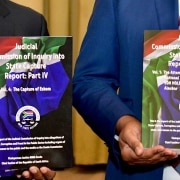|
Getting your Trinity Audio player ready...
|
Corruption Watch has become a fully-fledged chapter of Transparency International (TI), the global movement against corruption. The news concludes a four-year accreditation process and means we are now TI’s official representative in South Africa.
Established in 1993, TI is an NGO with more than 100 national chapters – for the most part locally established, independent organisations – worldwide and an international secretariat in Berlin. TI’s policy has always been to set up partnerships, preferably with existing organisations because they are familiar with the corruption situation in their respective countries and are best placed to tackle it.
But because corruption does not stop at national borders, the chapters play a crucial role in realising TI’s regional and global goals, while TI’s multi-country research and advocacy initiatives are also driven by the chapters.
Chapter accreditation is a lengthy but thorough and transparent process that aims to ensure the quality, integrity and cohesion of TI’s work around the world. Chapters are accredited according to a set of objective standards in three stages: from national contact, to national chapter in formation and finally to fully accredited national chapter status.
Full chapters undergo a review process every three years, aimed at strengthening their work and ensuring continuous compliance with TI’s standards.
As an official national chapter Corruption Watch now has voting rights at the movement’s annual membership meetings. Accredited chapters account for at least two-thirds of the voting power at such meetings, and together with the individual members they elect the board of directors and can also have a say in the way the organisation is run by voting on resolutions, which serve as the organisation’s official stance on world issues.
TI’s achievements
With the establishment of a strong multi-national anti-corruption movement, TI has brought the global issue of corruption to the fore in the political and social spaces. The organisation counts among its achievements:
- Actively participating in the drafting of the UN Convention against Corruption – a powerful instrument that has created an international norm to create a stronger and more globally integrated legislative framework for the fight against corruption.
- Co-developing a common anti-bribery code, the Business Principles for Countering Bribery.
- Co-designing RESIST (Resisting Extortions and Solicitations in International Transactions) to help companies resist solicitation and extortion demands efficiently and ethically, and reduce the likelihood that such demands are made.
- The prosecution of corrupt leaders and seizures of their illicitly gained riches.
- National elections won and lost on tackling corruption.
- Companies held accountable for their behaviour both at home and abroad.
- The development of a comprehensive set of complementary indices to measure perceived levels of corruption in any given country, including the Corruption Perceptions Index and Global Corruption Barometer.
- Successfully lobbying to bring an end to the tax deductibility of bribe payments in OECD countries.








